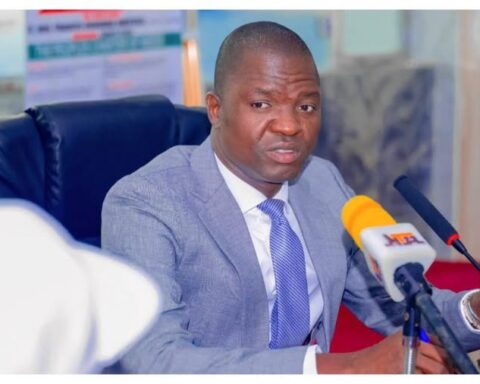The Nigerian Association of Chambers of Commerce, Industry, Mines, and Agriculture (NACCIMA), has described the latest report by the National Bureau of Statistics (NBS) claiming Nigeria’s Gross Domestic Product (GDP) growth of 3.46% and decline in unemployment rate to 4.6% for third quarter (Q3) of 2024, as “not a true reflection of the current realities in the country.
In a statement by its National President, Dele Kelvin Oye NACCIMA said that for not adequately addressing critical factors such as the rising taxation imposed by sub-nationals, the anticipated ramifications of the 2024 tax bill, and the adverse effects of regulatory barriers that hinder both local and foreign investment, among others, the NBS’ data, therefore, fell short of expectations as it does not reflect “the lived realities of countless citizens in the country.”
Said NACCIMA in the statement by Oye” “As representatives of the Nigerian Association of Chamber of Commerce, Industry, Mines & Agriculture (NACCIMA), we feel it is imperative to address the latest release by the National Bureau of Statistics (NBS) which reports Nigeria’s Gross Domestic Product (GDP) growth as 3.46% and the reported decline in unemployment figure to 4.6% for Q3 2024.
“We must advise caution on how these figures are received and interpreted given the current realities in light of the prevailing economic challenges confronting many Nigerians countrywide.
“The significant disconnect between these statistics and the lived realities of countless citizens is concerning. The Nigerian economy is still weighed down by the effects of hyperinflation stemming from frequent fuel price hikes, power shortages and Naira devaluation which resulted in a steep rise in the cost of living on ordinary Nigerians.”
“Under these circumstances, the assertion of robust GDP growth appears implausible, particularly as the purchasing power of the average citizen continues to erode alarmingly,” NACCIMA stressed in the Oye statement.
“Moreover, the claim of declining unemployment warrants thorough examination. While the statistics may suggest an improvement, it is crucial to distinguish between those merely recorded as job seekers and the broader challenges of under-employment and informal unemployment that persist in our labour market.”
“Many graduates and skilled workers remain unable to secure gainful employment, making it disheartening to suggest that a mere statistical reduction translates into genuine economic recovery or job creation.”
Stressing that the reality contradicts the narrative of growth posited by the NBS report, NACCIMA said: “The data from the NBS does not adequately consider critical factors such as the rising taxation imposed by sub-national entities (through the increasing use of tax consultants), the anticipated ramifications of the 2024 tax bill, and the adverse effects of regulatory barriers that hinder both local and foreign investment.
“The ongoing volatility within our oil and gas sector, coupled with the lack of innovative collaboration between regulatory agencies and private sector stakeholders who have made substantial investments contradicts the narrative of growth posited by the NBS report.
“Furthermore, the exasperating costs of borrowing, with commercial interest rates hovering between 35% and 40%, exacerbate the challenges faced by businesses attempting to maintain operations, let alone expand and contribute meaningfully to overall GDP growth.
“Therefore, any asserted growth in GDP must be contextualized within the extensive operational hurdles confronting entrepreneurs and the broader implications for sustainable development.”
“In light of the above, we urge the government and relevant authorities to engage more vigorously with the organized private sector, acknowledging their insights and addressing their concerns within the policy making process,” the statement further read.
“It is essential that statistical reporting reflects the true economic conditions on the ground so that any growth can be measured not just in numbers but also in terms of real improvements to the quality of life and economic opportunities available to our citizens.”
“In conclusion, while the NBS report might convey an optimistic narrative, we implore all stakeholders to consider the complexities and contradictions inherent in our economic landscape. It is only through an authentic understanding of these dynamics that Nigeria can aspire toward sustainable growth and development.
“We must recognize that mere growth that leaves 56% of Nigerians living in poverty, as reported by the World Bank in 2024, cannot be considered a success. Real growth necessitates a government commitment to supporting the private sector with appropriate policies and regulatory frameworks.
“We continue to offer our suggestions for reducing interest rates and stabilizing the Naira. It is vital that we work collaboratively toward collective success; anytime government missteps, it normally leads to widespread suffering, but with the right policies, we can achieve shared prosperity.”
“We advocate for genuine growth—not merely self-congratulatory statistics from the NBS that may mask deeper issues, akin to applying a Band-Aid to cancer. Without addressing the root causes of economic malaise, we risk further deterioration in the long run,” the statement surmised.
Follow us on all social media platforms @dailyquery for more stories around the globe.



























